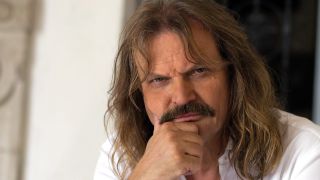How does a Hungarian music producer manage to attract a host of top talent from rock, pop and fusion to form an ever-changing supergroup? Leslie Mandoki has been doing just that for 25 years with ManDoki Soulmates, playing with a long list of musicians that includes Ian Anderson, Al Di Meola, Chaka Khan and Jack Bruce. Ahead of his first ever London show, Mandoki, who fled Communist Hungary in the 1970s, looks back on two and a half decades of making his rock dreams come true.
What inspired the ManDoki Soulmates concept?
I’m running on the vision of my dad, who was a great musician, and he said: “Boy, you should live your dreams and don’t dream your life.” That’s the track I’m running on. It was great advice. This is an idealistic band. I still believe that music can change the world to be a better place.
Soulmates member Midge Ure has described the band’s mission as being to promote tolerance in an intolerant world.
Yeah. With Soulmates we hold on to the idealism of our younger years. The pop music of today very often is like a text message; our music is like a hand-written love letter to our audience. We’re living in a digital world but we’re still analogue. We’re still idealistic. We have a vision. I think this has to have social relevance in what we do and say.
I always say: “Zero tolerance for intolerance.” That’s what it is. We should be a tolerant world, but we shouldn’t tolerate any intolerance – it doesn’t matter where it comes from. We have a great European culture, and tolerance is part of this great European culture. It’s a privilege that people are listening to us when we have something to say.
With so many big names appearing in every Soulmates performance, is it difficult to get everyone together?
Twenty-five years ago, we had a deal, kind of a blood contract, that we’d just talk to each other directly. Way before email, we’d just call each other. We don’t do this through promoters, record companies or management, this is person-to-person. And because of this it’s kind of easy. If an idea comes up, it’s not like we have to discuss it with a record company or concert promoter or publicist, we just do it.
After twenty-five years, you’re still bringing in new players. How did you get Snarky Puppy’s Cory Henry?
It’s tragic we lost Jack Bruce and Greg Lake. It’s a natural thing that there are young, fresh musicians who have the same dedication, the same conviction, the same idealism. I did it a very old-fashioned way. He played in Budapest, where I was born, and by accident I was there. I went backstage, and said: “Here’s an album of ours, here’s my card, and if you like it, just drop me an email.” Like Anthony Jackson said one day: “Let the music do the talking.”
Does your first London show bring any extra pressure?
We’re going right into the heartland of prog rock! I think the only pressure I have on my shoulders is not to reach out to the audience, but to explain to the professionals, the concert promoters, to make them understand what we’re doing. The audience is easy.
See www.mandoki-soulmates.com for more information.


